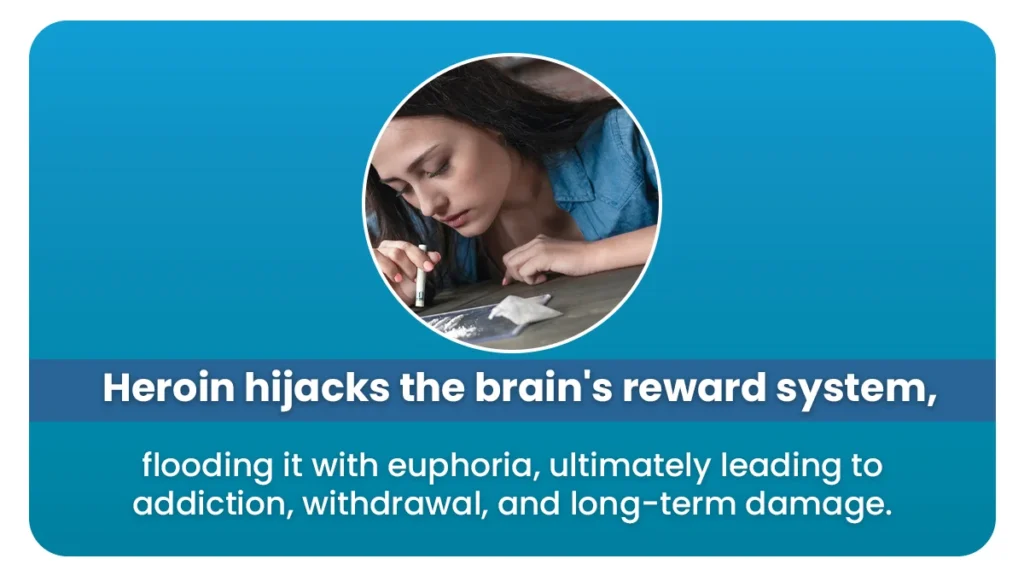Heroin, a potent opioid drug derived from morphine, interacts with the brain’s opioid receptors, resulting in profound effects on neural function. Upon entering the brain, heroin is converted back into morphine and binds to opioid receptors involved in pain perception, reward, and pleasure.
Chronic heroin use alters brain chemistry, leading to dependence and potentially devastating long-term effects on cognition and emotion regulation. This article will reflect on the neurological impacts of heroin use and foster an understanding of its addictive nature.
Key Takeaways
Heroin addiction is characterized by a strong need for the drug, causing severe dependency. Here is what you will learn:
- Heroin rapidly crosses the blood-brain barrier, binding to opioid receptors, leading to euphoria.
- Chronic heroin use alters brain chemistry, reducing natural opioid production and causing dependence.
- Prolonged heroin use damages the brain, contributing to addiction and cognitive impairments.
The Haven Detox-Little Rock offers personalized services to support individuals in overcoming heroin addiction. Call us at (501) 271-3342 to learn more.

Heroin And Its Prevalence
Heroin is a powerful and highly addictive substance extracted from the seed pod of certain varieties of poppy plants. Heroin usage is a concerning issue worldwide, with many individuals succumbing to its addictive grip.
Despite its illegal status, heroin continues to be abused, leading to devastating consequences for individuals and their communities. Efforts to address this epidemic are ongoing, focusing on education, prevention, and treatment initiatives.
The Brain’s Normal Functions
The brain is an incredibly complex organ responsible for a wide array of functions, from basic bodily processes to intricate cognitive abilities. Some of its normal functions include:
Introduction To The Brain’s Functions
The brain controls everything we do, from thinking and feeling to moving and breathing. It’s like the command center of our bodies. Inside our brains, there are tiny structures called opioid receptors that help regulate pleasure and pain. These receptors play a big role in how people feel pleasure.
The Brain And Pleasure Response
When people do something enjoyable, like eating chocolate or laughing with friends, their brains release chemicals called opioids. These chemicals bind to opioid receptors in the brain, making people feel happy and satisfied. However, when someone uses heroin, a powerful opioid, it hijacks these receptors, flooding the brain with intense pleasure.
Pain Perception In The Brain
On the flip side, when people experience pain, whether it’s from stubbing a toe or getting a paper cut, their brains also use opioid receptors to help manage it. Opioids released in response to pain can help lessen the hurt. However, with heroin use, the drug overwhelms the brain’s natural pain-relief system.
The Role Of Opioids In The Brain
Opioids are pivotal in the brain, moderating pain perception, mood, and reward through interactions with opioid receptors. Natural opioids like morphine and synthetic ones such as fentanyl employ these effects, potentially causing both short-term and permanent brain damage if misused.
Primarily acting on mu-opioid receptors, they manage pain while inducing pleasure responses. However, misuse disrupts normal brain function, increasing overdose risk and necessitating effective treatment options to mitigate long-term damage.
How Heroin Interacts With The Opioid System
When heroin enters the body, it swiftly travels to the brain through the bloodstream. Once in the brain, it changes into morphine, a potent opioid. Both heroin and morphine latch onto special receptors in the brain called mu-opioid receptors.
This attachment brings about effects like pain relief, happiness, and slower breathing. However, repeated heroin use can lead to addiction, damaging the brain and potentially affecting heart function.
Immediate Effects Of Heroin On The Brain
Heroin is an opioid drug that exerts its effects primarily by binding to opioid receptors in the brain. The immediate effects of heroin on the brain are profound and include:
The Rush: Early Changes In The Pleasure System
When someone takes heroin, it quickly triggers a rush of euphoria. This immediate effect of heroin floods the brain’s reward system with feel-good chemicals, leading to intense pleasure and relaxation. However, this surge in dopamine can also lead to addiction, as the brain associates heroin use with pleasure, prompting cravings for more.
Decreased Perception Of Pain
Another immediate effect of heroin is its ability to decrease the perception of pain. Heroin binds to opioid receptors in the brain and spinal cord, blocking pain signals and inducing a sense of numbness or bliss. However, this effect of heroin can be dangerous, as it may lead individuals to ignore injuries or medical conditions that require attention.
Effects On Other Cognitive Functions
Alongside its immediate effects on pleasure and pain, heroin can also impact other cognitive functions. Short-term effects of heroin include drowsiness, confusion, and impaired decision-making. Long-term heroin use can result in significant chemical changes in the brain, altering mood, memory, and learning abilities.
Long-Term Effects Of Heroin Use On The Brain
Heroin is an opioid drug that has significant detrimental effects on the brain when used chronically. Here are some of the long-term effects:
Rewiring Of The Brain’s Pleasure System
Long-term effects of heroin on the brain can lead to significant changes in the brain’s pleasure system. Heroin alters the physical structure of the brain, causing it to rely on the drug for the release of dopamine. This rewiring can result in strong cravings and a diminished response to natural rewards.
The Development Of Tolerance And Dependence
Continued heroin use can lead to the development of tolerance and dependence. The brain becomes accustomed to the presence of the drug, requiring higher doses to achieve the same effect. Dependence ensues, where the individual experiences withdrawal symptoms when attempting to stop using without medical supervision.
Changes In Behavior And Cognitive Abilities
Long-term heroin use can result in changes in behavior and cognitive abilities. Decision-making abilities may be impaired, leading to risky behaviors and poor judgment. The psychoactive substances in heroin can disrupt the function of other systems in the brain, contributing to cognitive impairment and impacting daily functioning.
The Consequences Of Chronic Heroin Use
Chronic heroin use can have severe consequences on both physical and mental health, as well as social and economic aspects of an individual’s life. Here are some of the potential consequences:
The Cycle Of Addiction
Heroin addiction often starts with heroin abuse, triggering the brain’s reward system. This leads to physical dependence, where the body relies on heroin to function. Cognitive Behavioral Therapy is vital in breaking this cycle, teaching coping strategies, and addressing underlying issues driving drug use.
Health Risks And Brain Damage
Long-term heroin use poses severe health risks, including brain damage. Heroin alters neurotransmitters, affecting mood and behavior. Chronic use can lead to psychological disorders like heroin use disorder. Furthermore, heroin overdose is a constant danger, highlighting the urgent need for intervention from medical professionals.
Psychological Disorders Associated With Long-Term Heroin Use
Heroin addiction can result in various psychological disorders due to its impact on the brain. These include depression, anxiety, and psychosis. Therapies are effective in addressing these issues by restructuring harmful thought patterns and behaviors.
Heroin Overdose And Its Effects On The Brain
Heroin overdose can severely damage the brain. When someone overdoses on heroin, it can slow down their breathing and heart rate, leading to a lack of oxygen in the brain. This lack of oxygen can cause brain cells to die, leading to permanent brain damage. Over time, repeated heroin use can also change the brain’s structure and function, affecting decision-making, memory, and emotions.
Frequently Asked Questions (FAQs)
How do drugs affect the brain?
Drugs can mess with how your brain works. They can change the way your brain sends messages. Some drugs can make you feel super good, but they can also mess with your judgment and decision-making. Others can make you feel relaxed or sleepy.
But abusing drugs can lead to addiction, which means your brain craves the drug, and it’s hard to stop using it. Long-term drug use can even harm your brain’s ability to think and remember stuff.
Does heroin kill brain cells?
Heroin can damage brain cells. It interferes with the brain’s communication system, disrupting the release of neurotransmitters, which are chemicals that help transmit signals throughout the brain. This disruption can lead to changes in brain structure and function over time.
Chronic heroin use can impair memory, decision-making, and other cognitive abilities. Additionally, heroin overdose can cause respiratory failure, depriving the brain of oxygen and leading to permanent brain damage or death.
Reclaim Your Life At The Haven Detox-Little Rock
Are you or a loved one struggling to break free from heroin addiction? At The Haven Detox-Little Rock, we understand the challenges that come with substance abuse.
Our medical detox services provide a safe and supportive environment to help you overcome withdrawal symptoms and begin the healing process.
Additionally, our residential treatment program offers personalized care to address the root causes of addiction for lasting sobriety.
With our specialized IV therapy, we ensure that your body receives the necessary nutrients and hydration for a smoother recovery process.Contact us at (501) 271-3342 and start your journey to sobriety.





